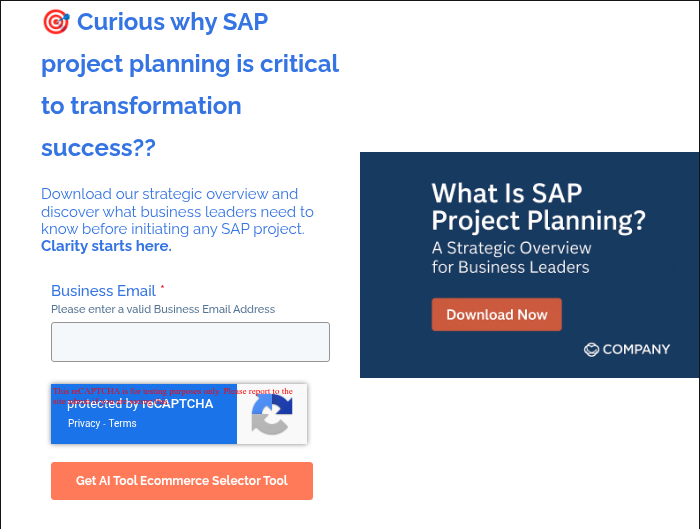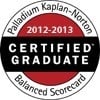What does a SAP project manager do, really? Many people see them as just schedule keepers, but their role is far more significant, especially as SAP software becomes more central to a company's operations. SAP project managers are the leaders behind successful SAP implementations, orchestrating a complex set of tasks and people to ensure projects are delivered effectively.

An SAP project manager is the central figure in any SAP implementation or upgrade project. They are accountable for the entire project lifecycle, from initial planning to final delivery and support. Their duties range from managing timelines and budgets to coordinating the project team and communicating with business stakeholders.
This blog post explores the day-to-day responsibilities of SAP project management. We will cover the key responsibilities, the skills required for success, and the common challenges faced in this dynamic career. This guide will provide a clear picture of why this role is so important for business success.
The Core Responsibilities of a SAP Project Manager
SAP project managers have a broad range of duties. Their primary goal is to ensure an SAP project is finished on schedule, within the allocated budget, and meets the client's strategic objectives. Here are some of their key responsibilities.
Project Planning and Initiation
Before any technical work begins, SAP project managers develop the foundation for the entire project. They create a detailed project plan that outlines the scope, objectives, deliverables, and timelines. This initial planning phase is fundamental to guiding the project and preventing issues later on.
The manager also establishes the project governance structure, which clarifies manager roles and decision-making processes. A key part of this is assembling the project team. They work to identify the necessary skills and bring on the right team members for each function, creating a capable and cohesive unit.
Defining the project scope is another critical task. The SAP project manager must work closely with clients and business stakeholders to get a deep understanding of their requirements. Setting clear boundaries and expectations from the start helps manage scope creep as the project progresses.
Resource Management
Managing resources is a continuous activity for any SAP project manager. A large part of this involves time management and making sure the right people are assigned to the correct tasks. This requires creating detailed schedules and allocating the team's time effectively to keep the project moving forward.
Budgeting is another core aspect of resource management. The manager is responsible for tracking all project expenses, from personnel costs to software licenses, ensuring the project stays within its financial limits. This is a delicate balancing act that involves careful financial planning, forecasting, and ongoing monitoring to effectively manage the management project.
Beyond schedules and budgets, managing project team dynamics is essential. The project manager fosters a collaborative environment, motivates team members, and addresses any conflicts that may arise. A well-managed team is more productive and better equipped to handle the pressures of complex projects.
Risk Management
Every project carries inherent risks, and a major SAP implementation is no different. A project manager must be skilled at identifying potential risks during the planning stages and developing proactive strategies to mitigate them. This often includes creating contingency plans or adjusting the project plan to avoid potential pitfalls.
They also need to be prepared for resolving issues that appear unexpectedly during execution. Strong problem-solving abilities are essential for handling these complex problems and adapting the project approach as needed. A good project manager can make quick, informed decisions to keep the project from derailing when challenges arise.
Stakeholder Communication
Effective communication is the lifeblood of a successful project, and SAP projects involve a wide array of stakeholders. The project manager serves as the central point of contact, keeping everyone from the project team to senior executives informed. They provide regular updates on project progress, milestones, and challenges.
A crucial skill is tailoring communication to different audiences. The technical team needs specific details, while business stakeholders require high-level summaries focused on business impact. Running productive status meetings and ensuring all stakeholders informed helps maintain alignment and trust throughout the project lifecycle.
Technical Knowledge and Skills

While an SAP project manager does not need to be a developer, they require a strong understanding of SAP systems and technology. This knowledge empowers them to make sound decisions, guide the technical team, and communicate with authority. This is a vital part of the skills required for the role.
Understanding SAP Modules
SAP offers a vast suite of modules that cater to different business functions. A competent project manager has a good understanding of core modules like Financial Accounting (FI), Controlling (CO), Sales and Distribution (SD), Human Capital Management (HCM), and supply chain management. This familiarity helps them grasp client needs and anticipate integration issues between different business process areas.
As technology evolves, this now also includes an understanding of newer solutions. Knowledge of SAP S/4HANA, the in-memory database cloud platform, and emerging areas like SAP Business AI is becoming increasingly important. Understanding how business AI can enhance business processes allows a manager to add strategic value.
Project Management Methodologies
SAP project managers typically use specific management methodologies built for SAP projects. Historically, ASAP (Accelerated SAP) was common, but today SAP Activate is the standard framework for most implementations, particularly for S/4HANA. These project management methodologies provide a structured approach and best practices for running a project smoothly.
SAP Activate combines elements of agile and waterfall methodologies, allowing for more flexibility and a focus on delivering value incrementally. A deep understanding of its phases—Prepare, Explore, Realize, and Deploy—is crucial. Adhering to such a methodology helps maintain a clean core, which is essential for long-term system health and upgradeability.
| Feature | ASAP (Accelerated SAP) | SAP Activate |
|---|---|---|
| Approach | Primarily a waterfall methodology with rigid phases. | A hybrid agile methodology that is more flexible. |
| Phases | Project Preparation, Business Blueprint, Realization, Final Preparation, Go-Live & Support. | Prepare, Explore, Realize, Deploy, Run. |
| Focus | Heavy upfront documentation and a linear process. | Best practices, agile builds, and quick time-to-value. |
| Best For | Traditional on-premise ERP projects, now considered legacy. | SAP S/4HANA implementations, cloud solutions, and any upgrade project. |
For those looking to formalize their expertise, an SAP PMP (Project Management Professional) certification can be valuable. It demonstrates a commitment to the profession and a solid grasp of these complex frameworks. It helps the SAP project manager stand out. Most SAP Project Manager roles require this these days.
SAP Solution Manager
SAP Solution Manager is a powerful platform that supports the entire application lifecycle of SAP software. SAP project managers use it extensively for project planning, documentation, test management, and change control. It acts as a single source of truth for the entire sap implementation.
Proficiency with SAP Solution Manager allows a manager to streamline processes, improve team collaboration, and maintain tight control over the project. For example, the Change Request Management (ChaRM) functionality is critical for managing system changes in a structured way. This tool is indispensable for both SAP HANA project management and broader SAP ERP project management.
Soft Skills for Success
Technical knowledge and methodological expertise are important, but soft skills are what truly define an exceptional SAP project manager. These skills are essential for managing the human elements of a project. Leadership skills, in particular, are at the forefront.
Leadership
SAP project managers must exhibit strong leadership to guide their teams toward a shared goal. This involves more than just giving orders; it includes motivating team members, resolving issues, and making difficult decisions under pressure. A great leader inspires their team to achieve their best work and fosters a positive, productive environment.
They often need to influence stakeholders and team members over whom they have no direct authority. Strong leadership skills enable them to build consensus and gain buy-in for the project's vision. This ability to lead through influence is a hallmark of an effective manager sap.
Problem-Solving
SAP projects are complex and rarely proceed without encountering some obstacles. An adept project manager can identify potential problems early and develop creative solutions before they escalate. They need to think critically and make swift, logical decisions when unexpected challenges threaten the project timeline or budget.
This skill also involves knowing when an issue can be handled by the managing project team and when it needs to be escalated to senior leadership or business stakeholders. A good project manager sap knows how to balance these decisions to maintain momentum. This ability often comes with years experience managing similar projects.
Adaptability
The SAP ecosystem is constantly advancing, with new technologies and best practices appearing all the time. Successful project managers are lifelong learners who stay current with these changes. They must be willing to adapt their methods and embrace new tools and approaches.
Flexibility is also required in daily work. Priorities in an SAP project can shift based on business needs or technical discoveries. The manager must effectively manage these changes and adjust the project plan without losing sight of the ultimate goals.
Challenges Faced by SAP Project Managers
The role of a project manager sap project manager is rewarding, but it is not without its difficulties. Understanding the challenges faced helps aspiring professionals prepare for what lies ahead. This section of our blog post will cover some common hurdles.
Scope Creep
One of the most persistent challenges in any large project is scope creep. As a project moves forward, clients or stakeholders may request additional features or changes not included in the original plan. Managing these requests while keeping the project on time and on budget is a major challenge.
To combat this, the project manager must implement a robust change management process. This involves documenting all change requests, assessing their impact, and getting formal approval before implementation. Clear communication and a firm but fair approach are necessary to control the project's boundaries.
Resistance to Change
An SAP implementation fundamentally alters how people do their jobs, which can lead to significant resistance from employees. People are often comfortable with existing business processes and may be wary of a new system. An sap project manager must work closely with change management specialists to address these concerns.
This involves more than just providing training; it means communicating the benefits of the new system and involving users in the process. The goal is to build buy-in and ensure high user adoption after go-live. A sap program manager often oversees this aspect across multiple projects.
Technical Complexities
SAP systems are inherently complex, and integrating them with a company's existing IT landscape can be difficult. While the sap project manager is not expected to solve these technical problems personally, they need to understand them. This allows them to manage risks and facilitate productive discussions between technical experts and business users.
Challenges often arise during data migration, custom developments, or integrations with third-party applications. The manager's role is to ensure these technical hurdles are addressed logically and do not derail the project. They translate technical jargon into business terms to keep everyone aligned.
The Impact of SAP Project Managers
The project manager might not always be the most visible person on a project, but their impact is undeniable. They are the conductors making sure the entire orchestra plays in harmony. Their vital role is what makes a successful project outcome possible.
Ensuring Project Success
A skilled SAP project manager can be the single most important factor in whether an implementation succeeds or fails. By keeping the project on track, managing risks, and fostering collaboration, they ensure the final solution meets the client's needs. Their ability to coordinate disparate teams and tasks prevents miscommunication and costly delays.
This coordination is critical in complex environments where many moving parts must align perfectly for a smooth go-live. The manager's oversight ensures the project delivers on its promises. A well-run project will be seen as a success by all involved.
Driving Business Transformation
Modern SAP projects are rarely just about technology; they are catalysts for business transformation. An SAP project manager plays a crucial part in this process by helping to align the SAP solution with broader strategic goals. They help the organization reimagine a business process or even entire business processes.
By managing the project effectively, they enable organizations to achieve the full benefits of their SAP investment. This can result in greater efficiency, improved data analytics, better decision-making, and a stronger competitive position. When you implement sap correctly, the business results follow.
Building Long-Term Relationships
Great SAP project managers think beyond the current project. They focus on building lasting relationships between the implementation partner and the client organization. A successful project builds trust that can lead to future engagements and ongoing support opportunities.
By delivering a positive experience and ensuring client satisfaction, they enhance the reputation of their entire team. In the competitive field of SAP consulting, these strong relationships are invaluable. The role of an sap it project manager often continues long after the initial implementation is complete.
Conclusion
So, what does a SAP project manager do? In essence, they are the central force that propels a successful SAP implementation forward. Their role is a dynamic mix of strategic planning, meticulous execution, stakeholder management, and proactive problem-solving.
SAP project managers need a balanced combination of technical knowledge, project management expertise, and essential soft skills. They confront numerous challenges, from managing scope to overcoming resistance, but their ability to navigate these hurdles makes them indispensable. The challenges faced only highlight their importance.
The impact of a great SAP project manager goes far beyond the completion of a single project. They are instrumental in driving business transformation, helping companies realize the full value of their technology investments, and building the relationships that support long-term success. They are truly key players in making digital transformation a reality.
We are full-service niche SAP consultancy. We provide SAP project management services, including Greenfield, Brownfield and Carve-Outs. In addition, we can supply all SAP Project Resources. In addition, we are a full-service Hubspot Certified Inbound Marketing and Sales Agency. In addition, we work to integrate your SAP System with Hubspot and Salesforce, where we have a deep delivery capability based on years of experience. Please our book a meeting service to get started.



